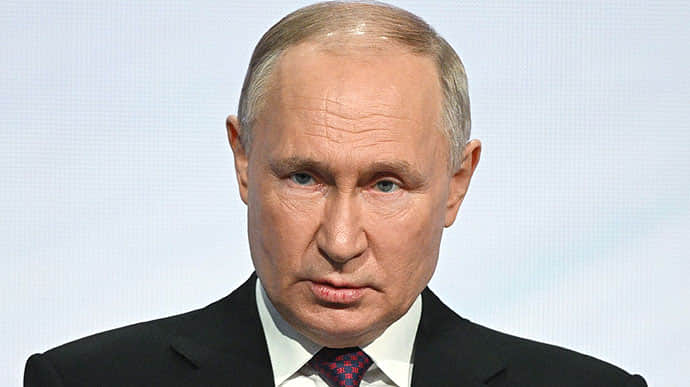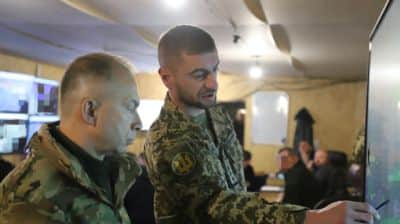Putin's statements about unwillingness to fight NATO are similar to those made before invasion of Ukraine − ISW

Statements by Russian dictator Vladimir Putin that Russia is not interested in invading NATO are very similar to the Kremlin's insistent statements in late 2021 and early 2022 − including on the eve of 24 February − that Russia did not intend to attack Ukraine.
Source: The Institute for the Study of War (ISW), which analysed Putin's detailed interview with the Russian state channel Russia-1 on 17 December where he threatened Finland and, at the same time, maintained that the Russian Federation had no intention of waging war on NATO.
Quote from ISW: "Putin’s reassurances about his peaceful intentions toward NATO ring hollow in the context of the threats he and Kremlin pundits have recently been making against NATO member states."
"Putin gave an extended interview with Russian state TV channel Russia-1 on 17 December, wherein he attempted to deny US President Joe Biden’s 6 December warning that Russia would attack a NATO country in the future if it won the war in Ukraine. Putin argued that Russia does not have any geopolitical, economic, military, or territorial reason to fight NATO and that Russia is interested in developing relations with NATO member states."
"The interview was likely a deliberate attempt to reamplify the Kremlin’s efforts to misrepresent the Russian military threat as an imaginary and artificial NATO invention."
Details: Analysts believe that none of these reassurances have any basis in fact.
They recall that on 21 July, Putin threatened Poland after Warsaw sent troops to the Belarusian-Polish border due to the relocation of Wagner group militants to Belarus. Then, the Russian President said that Russia would respond "with all the means" at its disposal.
On 29 August, Dmitry Medvedev, Deputy Chairman of the Russian Security Council, threatened that Russia had "an opportunity to act within the framework of jus ad bellum against everyone in NATO countries," commenting on the West's support for Ukrainian strikes on the occupied Crimea [jus ad bellum is the branch of law defining the legitimate reasons a state may engage in war and focusing on certain criteria that render a war just - ed.]. Similarly, Medvedev threatened Poland in November when he said Russia considered Warsaw a "dangerous enemy" that could lose its "statehood."
It is also reported that on 2 December, a Russian propagandist suggested on state TV that the Baltic states would become Russia's next military target and that they would fall shortly after Ukraine.
Russian propagandist Vladimir Solovyov, Medvedev and other Russian so-called experts constantly threaten to use nuclear weapons against the United States and other NATO member countries.
The ISW recalls that these threats are part of long-standing Russian narratives about a possible attack on NATO, which appeared even before Finland applied to join the Alliance and was accepted into it on 4 April.
"The statements of Russian pundits do not pose a military threat to NATO countries, to be sure, but they are important context for Putin’s ostensible effort to calm the waters during his 17 December interview," the experts are convinced.
They emphasise that Putin has been trying to limit and weaken NATO for two decades and is constantly demanding changes in the Alliance.
Quote from ISW: "Putin stated on 17 December that Russia does not have any "territorial disputes" with NATO countries in order to mask his actual long-standing objective to weaken Western unity and coerce NATO into abandoning its core principles, such as the ‘Open Door Policy’, which allows the alliance at its discretion to admit new members and is enshrined in the NATO Charter.
Putin has been consistently pursuing this goal throughout his regime and demonstrated his full commitment to it by ordering the Russian Foreign Ministry (MFA) to issue ultimatums to the US and NATO in December 2021 demanding "security guarantees" from NATO and commitments not to expand, among other things."
Details: Analysts are convinced that Putin wants to create conditions in which NATO will be undermined in its global power, will become structurally and ideologically weak, and will not be able to resist Russia's future goals, which may include territorial gains or the establishment of Russia’s right to partly rule over states that Moscow considers to be within its sphere of control.
The ISW reports that growing tensions between the US and Europe and within NATO and other Western structures could weaken the West's collective measures against the Kremlin's aggressive behaviour and allow Putin to develop a new network of coalitions that will contribute to achieving Russian goals.
Putin regularly repeats his dislike of Western alliances, calling for forming a multipolar world order in which Russia has the right to veto key world events.
Analysts are convinced that Putin wants NATO to recognise Russia's claims, demands and sphere of influence, and has repeatedly pointed out Russia's intentions to put an end to "US hegemony."
Quote from ISW: "Putin responded to a journalist’s question about how Russia can find common ground with the United States, stating that the United States will need to be the one to find common ground as the United States will need to ‘reckon’ with Russia, suggesting that Putin believes the US to be the weaker power and that Russia‘s perceived position of strength means that Russia has no need to find ‘common ground’ or engage in serious diplomatic negotiations with the United States."
Analysts believe both statements can be perceived as a poorly veiled threat to the United States and NATO.
ISW has previously suggested that Putin launched a full-scale invasion of Ukraine partly because he considered NATO weak, and not because the Kremlin felt a military threat from NATO.
The institute has also pointed out that Putin respects only military force, which, in his opinion, the United States and NATO will not use to protect Ukraine, and perhaps he expects that Western support for Ukraine will fail.
Analysts believe that the Kremlin's repeated rhetoric about its hostile intentions towards NATO, combined with Russia's potential future military potential in the event of a Russian victory in Ukraine, poses a severe threat to Western security.
They point out that if Russia could seize Ukraine, it "would be able to deploy forces right up to NATO’s border from the Black Sea to the Arctic Ocean."
"Given Russia’s demonstrated hostile intent towards NATO and its potential military capabilities along almost the entirety of NATO’s eastern border, the West would be obliged to prepare to defend against possible Russian action against NATO. The cost of these defensive measures would be astronomical and would likely be accompanied by a period of very high risk. Support for Ukraine offers the West the best opportunity to avoid these costs and the expanded Russian threat," the ISW said.
Support UP or become our patron!





